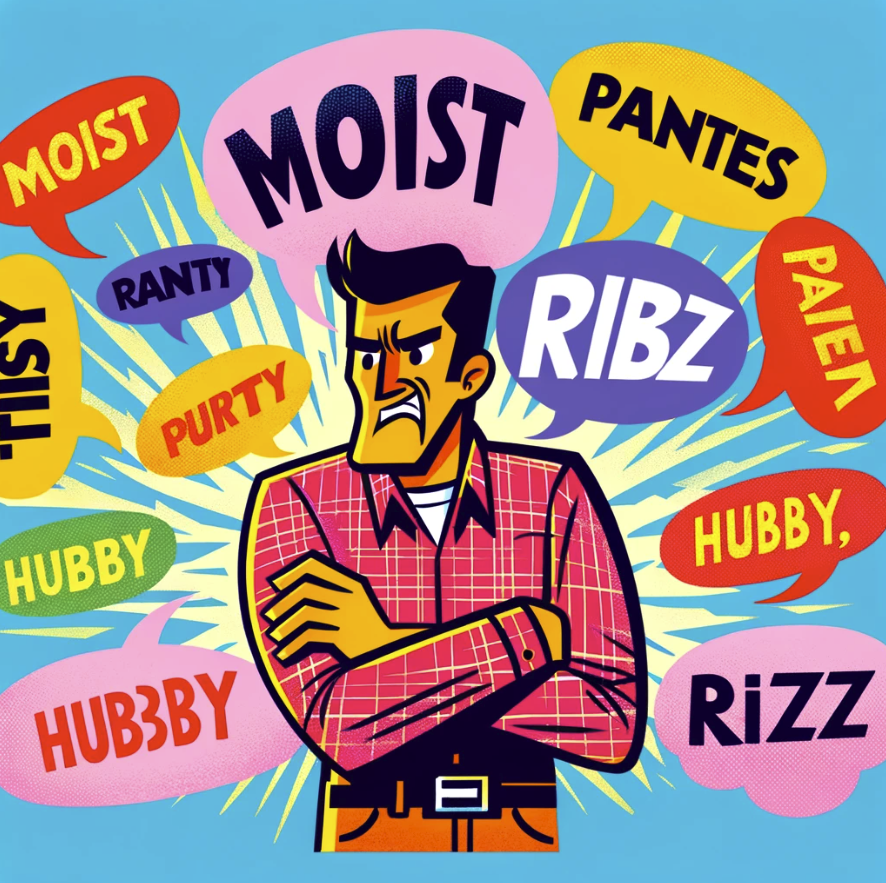Some words in English are widely disliked, leading to discussions around “most hated words” and phrases like “I hate the word…”
People’s reasons for disliking certain words vary, from their sound to their meaning.
Understanding why some words are so unpopular can tell us a lot about language and personal preferences.
Moist
“Moist” frequently tops lists of disliked words, primarily because many find the sound and associations unpleasant.
Panties
The word “panties” makes some uncomfortable due to its perceived childishness and awkward intimate connotations. It reminds some of “booties.”
Alternatives to panties include “underpants,” “undergarments,” “briefs,” “knickers” (UK), “bottoms,” “undies,” “intimates,” and “lingerie” (for more delicate or fancy types).
These alternatives provide a range of options from casual to formal, allowing you to pick a word that best fits the context and your preference.
Rizz
People often cringe at “rizz,” slang for exceptional flirting skills, due to its overuse in social media contexts, especially TikTok.
Content
Critics argue that “content” reduces all forms of digital creation to a mere commodity, undermining the artistry involved.
Hubby
“Hubby,” a casual term for husband.
Can irk those who find it overly cutesy or diminishing of the marital relationship.
Slay
Originally lauded for its empowering vibe, “slay” has been criticized for becoming a generic, overused term of praise.
Kiddo
While meant affectionately, “kiddo” can patronize, suggesting the recipient is less mature or capable than they are.
Gyatt
Emerging from internet culture, “gyatt” can confuse or annoy with its obscure origin and meaning tied to enthusiasm or agreement.
Problematic
“Problematic” has drawn ire for its vague, catch-all usage in describing complex issues without offering specific critiques.
Peace
Though universally positive, “peace” can seem insincere or superficial when used without genuine intent or understanding.
Folks
“Folks” aims for inclusivity but sometimes faces backlash for feeling forced or overly folksy in formal contexts.
Supper
The term “supper,” referring to an evening meal, can perplex or alienate those more accustomed to calling it “dinner.”
Bro
“Bro” has evolved from brotherly affection to a stereotype of fraternal insensitivity, annoying some with its casual overfamiliarity.
Partner
While “partner” seeks to be inclusive, it can frustrate by being too vague, leaving the nature of the partnership unclear.
Queer
Once a slur, “queer” is reclaimed by some in the LGBTQ+ community, but its use remains contentious and uncomfortable for others.
Neurodivergent
“Neurodivergent” serves to inclusively describe those with neurological differences, yet some find it overly clinical or vague.
Yummy
“Yummy” may express deliciousness simply, but to some, it sounds immature or insufficiently descriptive for truly delectable food.
Babe
While “babe” can be a term of endearment, it occasionally rankles those who see it as belittling or overly intimate in certain contexts.
Epic
Overuse has diluted “epic,” transforming it from a descriptor of grandeur to a tired hyperbole for anything mildly interesting.
Homophobia
Essential for discourse on LGBTQ+ rights, “homophobia” nonetheless faces criticism for implying a phobia rather than active bigotry.
Woke
Originally signifying awareness of social injustices, “woke” has polarized opinions, with some viewing it as performative or pretentious.
Swag
“Swag” intended to denote coolness or style, now often derided as outdated slang trying too hard to impress.
Resilience
Though “resilience” celebrates strength in adversity, some argue it shifts focus from systemic issues requiring collective action.
Stinky
“Stinky” straightforwardly describes unpleasant odors, yet its childish tone can irritate when used in serious discussions.
Y’all
Y’all” is celebrated for its inclusivity but criticized by some who view it as informally out of place in professional settings.
Love
A universally cherished concept, “love” can frustrate when its profound significance is diluted by overuse in trivial contexts.
Tantrum
“Tantrum” effectively conveys a fit of rage, typically in children, but its use for adults can demean their emotions as childish.
Adulting
“Adulting” humorously refers to performing adult responsibilities, yet some find it annoyingly suggestive of a generational reluctance to mature.
No
Simple yet powerful, “no” is essential for setting boundaries, but its directness can be perceived as harsh or uncooperative.
Veggies
“Veggies” attempts to endearingly refer to vegetables, but some find the term too cutesy or childish for serious nutritional discussions.
Organic
While “organic” signifies healthier, environmentally friendly food production, it can frustrate with its vague marketing overuse and higher prices.
Sure
“Sure” can ambiguously signal agreement, but its casual nature sometimes leaves doubts about the speaker’s enthusiasm or commitment.
Vibe or Vibes
Popular in describing atmospheres or feelings, “vibe” or “vibes” can annoy when overused or when it replaces more precise descriptions.
Influencer
“Influencer” recognizes social media personalities who impact their followers, yet it can draw ire for implying superficiality or inauthenticity.
Shook
“Shook” expresses shock or disbelief effectively but can irk those who see it as an exaggerated reaction to mundane events.
Bruh
“Bruh” conveys a laid-back camaraderie but can grate on those who find it overly informal or misused outside of its original contexts.
Wholesome
“Wholesome” is intended to evoke purity and goodness, but its frequent use in social media has led some to view it as saccharine or insincere.
Upgrade
“Upgrade” suggests improvement or enhancement, yet its application to personal relationships or non-technical contexts can seem cold or impersonal.
Tummy
“Tummy,” a childlike term for stomach, can annoy adults seeking more mature terminology for discussions about health or anatomy.
Toxic
“Toxic” has become a go-to adjective for harmful relationships or environments, but its ubiquity has diluted its impact and specificity.
Crimes
“Crimes” appropriately denotes illegal activities, yet its broad use can sometimes obscure the severity or specifics of the wrongdoing.
Stakeholder
“Stakeholder” is crucial in business and policy discussions, but its overuse can render it jargonish and vague to those outside specific fields.
Umami
“Umami” describes the savory taste fifth basic taste, yet its recent popularity in culinary discussions can confuse or seem pretentious to some.
Adorkable
“Adorkable” merges “adorable” and “dork” to describe charmingly quirky individuals, but critics argue it trivializes genuine uniqueness under a trendy label.
Triggered
Originally medical terminology for inducing a symptomatic response, “triggered” is now often misused, diminishing its serious connotations for mental health.
Feisty
“Feisty” aims to compliment spiritedness, particularly in women, but can backfire by implying that assertiveness is surprising or unusual.
Simp
“Simp” has evolved in internet culture to mock excessive deference to someone, especially in pursuit of attraction, often criticized for perpetuating toxic masculinity.
Literally
Overuse has expanded “literally” from its strict meaning to an intensifier for figurative statements, irritating purists with its inaccuracy.
Belly
“Belly,” a casual term for the stomach, can sound too informal or juvenile in discussions about health or fitness.
Impactful
“Impactful” strives to denote significant influence or effect, yet its frequent use in corporate and academic circles has rendered it clichéd.
Gaslighting
“Gaslighting” describes manipulating someone into questioning their reality, but its overapplication risks diluting the gravity of this serious form of abuse.
Q&A – Most Hated English Words
What are the most hated words in the English language?
Some of the most hated words in the English language include “moist,” “phlegm,” “ointment,” “panties,” and “slurp.” These words often evoke strong negative reactions due to their sound, meaning, or the physical response they trigger in listeners.
Why do people dislike the word “moist” so much?
The word “moist” is disliked by many due to its association with bodily functions, dampness, and textures that people find unpleasant.
The sound of the word, particularly the combination of the soft “m” and the hissing “st,” also contributes to its unpopularity.
What does “rizz” mean, and why is it unpopular?
“Rizz” is slang derived from the internet and social media, referring to someone’s skill in flirting or attracting romantic partners.
It is unpopular among some because it can be seen as reducing complex social interactions to a simplistic, game-like concept.
Additionally, its overuse and association with online bragging rights contribute to its negative reception.
I hate the word panties. What other word can I use?
If you dislike the word “panties,” you can use alternatives such as “underwear,” “undergarments,” “bottoms,” “knickers,” or “intimates.” These terms serve the same purpose while possibly feeling more comfortable or formal.
Some women also prefer referring to underwear by the style, so instead of saying “panties” one could say “briefs” or “thongs.”
All in all, “underwear” is the most obvious alternative word to “panties” but some argue that “underwear” can also include bras and is too broad, which makes some prefer to use words like “briefs.”
How do words become widely disliked or considered annoying?
Words become widely disliked or considered annoying through overuse, particularly in inappropriate contexts, negative associations, or unpleasant sounds.
Social media and cultural trends can amplify these feelings, making certain words particularly grating to a wide audience.
Can the dislike for certain words change over time?
Yes, the dislike for certain words can change over time as language and cultural contexts evolve. Words that were once considered annoying or offensive can become neutral or even endearing, depending on shifts in societal attitudes and the way language is used.
Are there any words that used to be disliked but are now accepted or even popular?
Words such as “geek” and “nerd” were once viewed negatively but have become more accepted and even embraced as popular culture has celebrated intelligence, technical skill, and passion for specific interests.
How do cultural differences influence which words are disliked?
Cultural differences significantly influence which words are disliked, as language is deeply tied to cultural norms and values. What is considered offensive or unpleasant in one culture may be neutral or even positive in another, depending on historical context, social norms, and linguistic characteristics.
What impact does social media have on the popularity or dislike of certain words?
Social media can have a significant impact on the popularity or dislike of certain words by amplifying their usage across wide audiences quickly. Memes, viral content, and social media trends can turn obscure terms into common language or make previously neutral words annoying through overexposure.
Why do some people have strong negative reactions to specific words?
Some people have strong negative reactions to specific words due to personal experiences, cultural background, or inherent characteristics of the words themselves, such as their sound, meaning, or the physical sensations they evoke. Psychological factors, such as disgust sensitivity or associative memory, also play a role.
How do new words get added to the list of most hated words?
New words often get added to the list of most hated words as they become popularized through media, internet culture, and social trends.
When these words are overused, misused, or associated with negative or controversial contexts, public sentiment can shift quickly, leading to widespread dislike. Feedback loops on social media can accelerate this process, as people share and amplify their reactions to certain words.
Is there any research on the psychology behind hating certain words?
Yes, there is research on the psychology behind hating certain words, focusing on phenomena like word aversion and misophonia. Studies suggest that negative reactions to specific words can be tied to the way they sound, the physical reactions they provoke (such as disgust or discomfort), and personal or cultural associations.
For example, dislike for the word “moist” has been studied extensively, with researchers suggesting that its combination of sound and semantic associations contributes to its unpopularity.
How do language trends affect the perception of words over time?
Language trends significantly affect the perception of words over time through the natural evolution of language, the influence of media and pop culture, and shifts in social attitudes and values. Words that were once common can become archaic or change in meaning, while new terms can emerge and gain popularity.
Public sentiment towards specific words can evolve as they are used in new contexts, reflecting broader cultural changes.
Additionally, the rise of social media has accelerated language trends, allowing words to gain and lose favor at a much faster pace than in the past.
Conclusion
This wraps up our exploration of these particular English words that evoke strong reactions.
Each has its place in the language, but their impact can vary widely among different audiences.
Language is dynamic, and the popularity or dislike of certain words is a reflection of ongoing cultural, technological, and social transformations. The words we love or hate today may be viewed differently by future generations, as they will be influenced by contexts and experiences that are yet to unfold.


